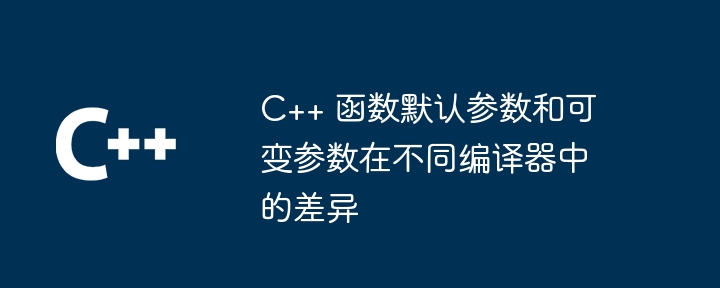
Default parameters allow functions to use default values, supported in C 11 and above, using different syntax in Visual Studio. Variadics allow functions to receive variable arguments. Supported in C 11 and above. Not supported in Visual Studio. Special syntax is required in GCC.

Differences in C function default parameters and variable parameters in different compilers
Default parameters
Default parameters allow functions to use predefined values when the corresponding parameters are not provided. C 11 and later supports default parameters.
In Visual Studio, you can specify default parameters using the following syntax:
int AddNumbers(int a, int b = 10) {
return a + b;
}In GCC, use the following syntax:
int AddNumbers(int a, int b = 10) __attribute__((deprecated));
Variable parameters
Variable parameters allow a function to receive an indefinite number of parameters. C 11 and later supports variadic arguments.
In Visual Studio, you can use ... to represent variable parameters:
void PrintNumbers(int n, ...) {
va_list args;
va_start(args, n);
for (int i = 0; i < n; i++) {
cout << va_arg(args, int) << " ";
}
va_end(args);
}In GCC, use the following syntax:
void PrintNumbers(int n, ...) __attribute__((deprecated));
Actual case
Default parameter case:
int main() {
// 使用默认参数
int sum1 = AddNumbers(5); // sum1 为 15
// 不使用默认参数
int sum2 = AddNumbers(5, 20); // sum2 为 25
return 0;
}Variable parameter case:
int main() {
// 声明并初始化可变参数列表
int n = 5;
int numbers[] = {1, 2, 3, 4, 5};
// 使用可变参数函数打印数字
PrintNumbers(n, numbers); // 输出:1 2 3 4 5
return 0;
}Note
__attribute__((deprecated)) in the default parameter indicates that the feature is deprecated but is still supported. Please use caution when using. The above is the detailed content of Differences in C++ function default parameters and variable parameters in different compilers. For more information, please follow other related articles on the PHP Chinese website!
 What are the differences between c++ and c language
What are the differences between c++ and c language
 Recommended learning order for c++ and python
Recommended learning order for c++ and python
 Cost-effectiveness analysis of learning python and c++
Cost-effectiveness analysis of learning python and c++
 Is c language the same as c++?
Is c language the same as c++?
 Which is better to learn first, c language or c++?
Which is better to learn first, c language or c++?
 The difference and connection between c language and c++
The difference and connection between c language and c++
 C++ software Chinese change tutorial
C++ software Chinese change tutorial
 Cost-effectiveness analysis of learning python, java and c++
Cost-effectiveness analysis of learning python, java and c++




